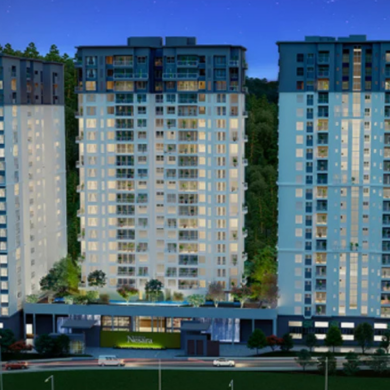
Sustainable infrastructure, intelligent utilities, digital governance, and efficient transport are some of the features of Gandhinagar Smart City, that are creating a modern urban hub with improved quality of life, eco-friendly initiatives, and economic growth.
The capital of Gujarat has transformed significantly over the years, evolving from a planned city to an exemplary smart city. As one of the pioneers in India’s Smart City mission, Gandhinagar represents the country’s vision of technological integration, sustainable urban development, and enhanced quality of life.
Smart cities in India aim to offer advanced infrastructure, improved governance, and efficient service delivery – fostering a better living environment for residents. Gandhinagar stands out among Gujarat’s smart cities due to its comprehensive approach towards digitisation, green initiatives, and resilient infrastructure.
It combines innovation with sustainability, making it a model for modern urbanisation. The features of Gandhinagar Smart City range from extensive public Wi-Fi networks to eco-friendly transport and advanced safety measures – establishing it as a progressive urban centre. This blog explores the top features of Gandhinagar Smart City, that have positioned it as one of the innovators in the country.
Table of Contents
Vision and Objectives of Gandhinagar Smart City
The vision of Gandhinagar Smart City is to transform the capital of Gujarat into a sustainable urban hub that prioritises both technological advancement and environmental balance. Central to this vision are key objectives like improving the quality of life, establishing efficient infrastructure, and enhancing urban mobility.
Smart City solutions in Gandhinagar aim to offer seamless services, promote eco-friendly practices, and create an inclusive community for residents. By aligning with these goals, the features of Gandhinagar Smart City contribute towards creating a well-connected, resilient, and future-ready urban centre.
Top 8 Features of Gandhinagar Smart City
With seamless connectivity and citizen-centric services, the capital of Gujarat is shaping into a well-connected, sustainable urban hub. Smart utilities in Gandhinagar include automated power and water systems, smart traffic management, and energy-efficient buildings. The features of Gandhinagar Smart City focus on intelligent infrastructure, sustainable planning, and digital governance.
-
Intelligent Infrastructure
Gandhinagar Smart City’s intelligent infrastructure focuses on smart utilities management and real-time monitoring through the Integrated Command and Control Centre (ICCC). The city features automated power supply, water management, and waste collection systems – ensuring efficient resource utilisation and improved service delivery.
Covering 66 sq km with 50 sq km of WiFi coverage, the ICCC facilitates emergency response, traffic management, and other essential services. With over 1000 smart streetlights, 13 public address systems, and 5 digital signages, the Smart City solutions in Gandhinagar enable seamless operations and safety. These features of Gandhinagar Smart City underscore its commitment to becoming a well-connected, technology-driven urban hub.
-
Smart Transport and Mobility
Smart transport in Gandhinagar aims to enhance mobility while reducing congestion and pollution. The city’s intelligent transport systems include real-time traffic updates, smart signals, and congestion control to ensure smoother commutes. Public transport upgrades, like electric buses and improved bus facilities with advanced vehicular technology, provide eco-friendly options for residents.
Integrated ticketing systems and last-mile para-transport connectivity further support efficient travel. The ongoing Ahmedabad-Gandhinagar Metro project is set to strengthen connectivity between the two cities, making commuting more convenient. These features of Gandhinagar Smart City highlight its commitment to creating a well-connected, sustainable urban mobility network.
-
Sustainable Urban Planning
At the core of sustainable urban planning in Gandhinagar is a strong emphasis on greenery and eco-friendly initiatives. The city has expanded green spaces to improve air quality and provide recreational areas, aligning with its vision of sustainability. Initiatives like rainwater harvesting, solar power installations, and energy-efficient buildings contribute to minimising the ecological footprint.
The expansive solar park and iconic Akshardham Temple that is powered entirely by solar energy, highlight Gandhinagar’s commitment to renewable energy. These features of Gandhinagar Smart City showcase how sustainable urban planning aims to achieve a harmonious blend of urban development and environmental balance.
-
ICT Integration and Digital Governance
ICT integration in Gandhinagar is shaping a model of smart governance that ensures efficient, transparent, and citizen-centric services. The city’s digital governance focuses on e-governance services – enabling residents to access digitised processes for property registration, licenses, and grievance redressal, all through automated systems. This technology-driven approach enhances service delivery and reduces bureaucratic delays.
By fostering inclusivity and convenience, digital governance in Gandhinagar exemplifies how automation can improve urban management. These features of Gandhinagar Smart City demonstrate its commitment to leveraging technology for a more efficient, accessible, and progressive urban environment.
-
Safety and Surveillance
Gandhinagar Smart City prioritises citizen safety through intelligent systems that integrate surveillance and disaster management. The Integrated Command and Control Centre (ICCC) acts as the central hub for monitoring and response, supporting the installation of CCTV cameras across public areas.
This smart surveillance system enhances overall security and focuses on women’s safety through emergency call boxes, making the city safer and more liveable. The disaster management framework includes Emergency Rapid Response System that leverages IMD data to minimise risks and ensure timely assistance during natural calamities. These features of Gandhinagar Smart City reflect its commitment to creating a secure and resilient urban environment for its residents.
-
Smart Utilities and Waste Management
Gandhinagar’s smart utilities framework ensures efficient resource management, focusing on water and waste management. The Gandhinagar smart water management system employs automated leakage detection and efficient distribution, to minimise water loss and enhance supply reliability. This ensures residents receive uninterrupted access to clean water.
On the other hand, solid waste management follows an automated approach with waste segregation at the source, effective collection, and recycling measures. The city’s innovative waste-to-energy projects further showcase its commitment to sustainability. These features of Gandhinagar Smart City reflect a holistic approach to resource conservation – contributing to a cleaner, greener, and more efficient urban landscape.
-
Energy Management in Gandhinagar
Energy management in Gandhinagar focuses on efficient energy utilisation and sustainable practices. The smart grid system ensures effective energy distribution with minimal transmission losses, supported by the Electrical Utility Management System (EUMS) for real-time monitoring. Key features include LED smart lights, CCMS-integrated LED streetlights, and rooftop solar panels – all aimed at reducing energy demand and enhancing sustainability.
Renewable energy projects, like the solar rooftop PV systems, enable the city to shift from conventional sources to cleaner alternatives. These features of Gandhinagar Smart City highlight its commitment to sustainable energy management – ensuring a greener and more efficient urban environment.
-
Citizen Engagement and Services
Gandhinagar’s smart city initiatives prioritise citizen-centric services, promoting active public engagement and participation. Features like Smart Help – a 24/7 help desk and call centre with multilevel IVR – ensure seamless connectivity with city administration, empowering citizens to lodge complaints, seek assistance, and obtain emergency information effortlessly. These features of Gandhinagar Smart City have improved operational efficiency, and strengthened trust & confidence among residents in city management.
Benefits of Gandhinagar as a Smart City
Thoughtful features of Gandhinagar Smart City have led to a range of benefits, from improved quality of life and sustainable environmental practices to enhanced economic growth. These initiatives collectively transform Gandhinagar into a progressive urban hub.
-
Improved Quality of Life for Residents
The features of Gandhinagar Smart City have significantly improved the quality of life for its residents. Smart utilities, efficient transport, and digital governance have made daily activities more convenient and accessible. Citizen-centric services and safety measures contribute to a safer, well-connected environment – positioning Gandhinagar urban development as a model for modern living.
-
Environmental Benefits Through Sustainable Initiatives
The benefits of Gandhinagar Smart City extend to its eco-friendly urban development. Green spaces, solar energy, and smart water management reflect a strong focus on sustainability. Smart city features in Gandhinagar, like rainwater harvesting and energy-efficient infrastructure, ensure reduced pollution levels and healthier environment for all residents.
-
Enhanced Economic Growth Prospects and Employment Opportunities
Smart city features in Gandhinagar stimulate economic growth through improved infrastructure, better connectivity, and digital learning programs. The city’s focus on skill development and digitisation creates new job opportunities, supporting local businesses. These benefits of Gandhinagar Smart City attract investments, boosting the overall economic landscape and residents’ financial prospects.
Read More: Top 10 Posh Areas in Gandhinagar.
GIFT City: The Nearest Best Investment Opportunity
Located in Gandhinagar, GIFT City stands out as a premier investment opportunity for those seeking high returns in Gujarat’s thriving real estate sector. Designed as India’s first operational greenfield smart city and International Financial Services Centre (IFSC), GIFT City aligns with the features of Gandhinagar Smart City by promoting sustainable development, digital infrastructure, and economic growth.
This financial hub offers state-of-the-art commercial spaces, residential projects, and social facilities – making it an attractive choice for investors. GIFT City investment opportunities extend beyond real estate, encompassing sectors like banking, fintech, insurance, and IT services – which thrive within its integrated ecosystem.
Its strategic location between Gandhinagar and Ahmedabad provides easy access to government offices, educational institutions, and transport hubs – enhancing its appeal. Investing in GIFT City means benefiting from policies favouring ease of business, tax incentives, and future-ready infrastructure.
As Gandhinagar continues to grow as a Smart City, GIFT City complements its vision by boosting regional development and offering excellent prospects for investors looking to be part of India’s evolving urban landscape.
Challenges Faced and Solutions Adopted
A key challenge that Gandhinagar encounters as it strives to establish itself as a leading financial hub is regulatory and policy complexities. Navigating regulatory frameworks and policies can impede the ease of doing business, making it important to enhance regulatory clarity and streamline processes to attract more international firms.
The features of Gandhinagar Smart City ensure seamless e-governance, enabling digital services that simplify regulatory processes. This approach aligns with its objectives of improving ease of doing business. The introduction of ICCC has demonstrated successful coordination across departments, offering a model for regulatory clarity and faster approvals.
Prospects of Gandhinagar Smart City
Centred on sustainability, green initiatives, and infrastructure enhancement, the prospects of Gandhinagar Smart City are bright.
A key development is the Green Institutional Core Zone along the Central Vista, covering 470 hectares. This zone will enhance urban aesthetics while promoting environmental balance.
The Green Network Project aims to create interconnected green spaces and streets, ensuring that nearly 23% of Gandhinagar Municipal Corporation’s (GMC) area is dedicated to green spaces and forests.
A significant addition is the regional bio-diversity park, which will span 500 hectares from Indroda Nature Park to Gandhinagar city, reinforcing the focus on preserving natural habitats and promoting eco-tourism.
These initiatives align with the features of Gandhinagar Smart City, demonstrating its commitment to a greener, more sustainable urban environment.
Read More: Best Places for Real Estate Investment in Gandhinagar.
Conclusion
The features of Gandhinagar Smart City include sustainable infrastructure, smart utilities, efficient transport, and digital governance. These initiatives enhance the quality of life, promote sustainability, and drive economic growth – making the capital of Gujarat a resilient urban hub. Alongside GIFT City’s strategic prospects, Gandhinagar is leading Gujarat’s progress as a forward-thinking state.
As the city evolves, active support from residents and businesses is vital to achieving its vision. By embracing smart solutions and supporting the features of Gandhinagar Smart City, citizens can contribute to a cleaner, safer, and more vibrant urban future.
FAQs
1. What is Gandhinagar Smart City?
Gandhinagar Smart City is an initiative to transform the capital of Gujarat into a sustainable, tech-driven urban centre with improved infrastructure, governance, and quality of life.
2. What are the top features of Gandhinagar Smart City?
The top features of Gandhinagar Smart City are intelligent infrastructure, smart transport, ICT integration, energy management, green spaces, citizen platforms, and smart surveillance.
3. How is Gandhinagar improving public transport as part of its smart city project?
Gandhinagar is improving public transport by introducing electric buses, smart transit facilities, integrated ticketing systems, and designated pedestrian and cycling paths.
4. How is GIFT City related to Gandhinagar Smart City?
GIFT City is related to Gandhinagar Smart City as a world-class fintech hub in the vicinity offering smart infrastructure, connectivity, and investment opportunities – complementing the features of Gandhinagar Smart City.
5. What are some of the sustainable features in Gandhinagar Smart City?
Some of the sustainable features in Gandhinagar Smart City include rainwater harvesting, solar power installations, energy-efficient buildings, and extensive green spaces.
6. What makes GIFT City a good investment opportunity?
GIFT City is a good investment opportunity due to its smart infrastructure, SEZ benefits, IFSC status, advanced facilities, and proximity to Gandhinagar & Ahmedabad.
7. How can residents participate in Gandhinagar’s smart city initiatives?
Residents can participate in Gandhinagar’s smart city initiatives through digital platforms and mobile apps for feedback, e-governance, and community involvement.
8. What are the benefits of living in Gandhinagar Smart City?
The benefits of living in Gandhinagar Smart City are improved quality of life, smart public services, better connectivity, and access to green initiatives and modern facilities.
9. How does Gandhinagar Smart City compare to other smart cities in India?
Gandhinagar Smart City, as compared to other smart cities in India, is at an advantage due to its sustainability, smart utilities, citizen-focused initiatives, and proximity to GIFT City that offers unique business opportunities.
10. What are some upcoming projects in Gandhinagar Smart City?
Some upcoming projects in Gandhinagar Smart City include expanded renewable energy initiatives, smart grid systems, advanced waste management, and improved public transport.







